Catholicism’s Religious Weasel Words
Catholicism’s Religious Weasel Words
Spiritual terms and phrases used by the Catholic Church to deceive their members and others
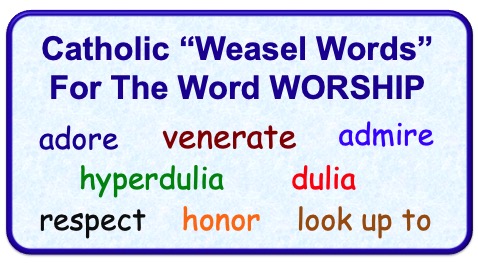
Introduction:
We are going to take a brief look at how the Catholic Church uses words to deceive their members. The have invented their own spiritual terms and they redefine existing spiritual words and terms, like grace and worship. Many cults do this and it appears to be a very effective method for deceiving their members who often don’t realize how their cult’s spiritual terms may have very different meanings than those same terms used by others outside their cult. Also those terms may have definitions that do NOT agree with the meaning of words used by the translators of the Holy Bible. For example, many Catholics think that the word “gospel” only refers to the first four books of the New Testament. They don’t realize that it is a word that is often used by true Christians to mean the “Good News” of salvation. Catholics don’t need to know about this second meaning of “gospel” because their Church does not have the true “gospel” – the true “Good News” of salvation by the merits of Jesus Christ ALONE. Instead, the Catholic Church has an elaborate “system” of sacraments, prayers and rituals they teach their members, a system designed to enable Catholics to ACHIEVE or ASSIST IN their salvation – with the assistance of the “almighty” Catholic Church.
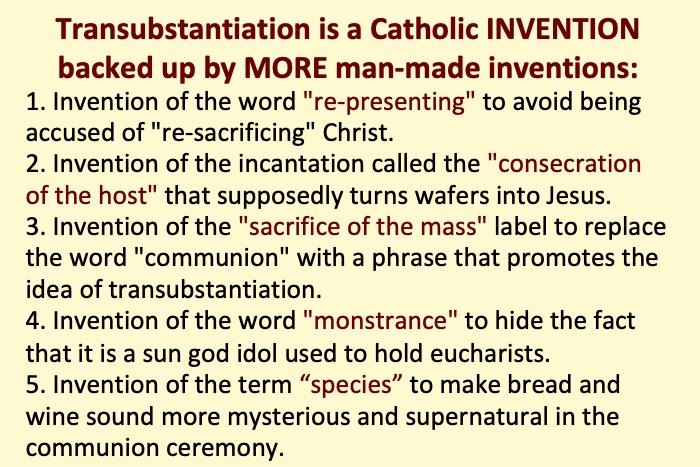
Weasel Words to redefine what “worship” is:
In the Catholic Church, members are taught to worship a glorified goddess-like version of Mary, the earthly mother of Jesus. They are taught to make, own and bow down to statutes of this Mary. They are taught to pray to this Mary because somehow (in spite of not being Divine) she can hear every Catholic’s prayers and then she can somehow act upon those prayers and relay them to the Lord Jesus Christ in heaven. Since all of these abilities of this glorified Mary are god-like, then those actions pertaining to this Catholic version of Mary can legitimately be called acts of worship. So, to make it appear that those are NOT sinful acts of worship, the Catholic Church has come up with some convincing excuses to make it look like they are not committing the sin of worshiping someone who is not God. Primarily what they have done is to claim that there are 3 flavors/kinds of worship in Catholicism and that the Mary flavor is NOT the same flavor of worship as the God flavor. Here are those 3 flavors of Catholic Worship:
Latria – highest form of worship reserved for God alone.
Hyperdulia – worship that is higher than dulia but not as high as latria.
Protodulia – the reverence or worship of Joseph, the earthly father of Jesus.
Dulia – lowest form of worship, allowed by Catholicism for worship of saints, including the worship of their relics and bones.
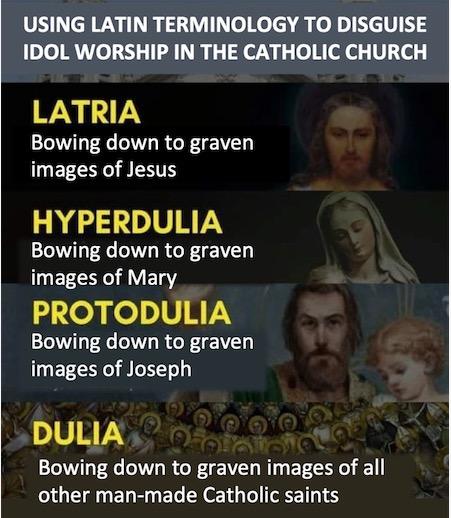
Rome’s use of the words latria, dulia, protodulia and hyperdulia is what honest people call “weasel words“, as defined here, namely the highlighted portion of the following definition:
weasel words:
noun [ plural ]
something that someone says either to avoid answering a question clearly or to make someone believe something that is not true
If an act you perform is an act of worship in the eyes of God Almighty, it matters NOT what you call it or how you redefine your actions. So, while the use of “weasel words” may deceive the members of the Catholic Church into thinking that they are not sinning against God by their worship of Mary and other Catholic saints, they really are sinning against God, and need to REPENT (not do penance which is far different than repenting of a sin). CLAIMING that you are not worshipping Mary like you worship God is simply a claim. Labeling your worship of Mary “hyperdulia” is simply a label used to try to disguise the sin of idolatry.
And there is undeniable evidence that Catholics truly worship their man-made version of Mary as if she were a goddess:
- The Catholic Mary is given the names that would be given to goddesses including the names “Queen of heaven” and “Queen of the Universe”.
- The Catholic Mary is called the Mother of God putting her on the level of God if not higher than God.
- The Catholic Mary is prayed to as if she had the god-like ability to be everywhere at once (omnipresence) and the ability to do something about all those prayers (omnipotence).
- The Catholic Mary is without a doubt, the most popular religious statue in the arsenal of statues that makes up the Catholic Church. And just about every pagan religion has statues of its gods and goddesses, not simply statues of their mere mortal folk heroes.
- Bowing down to a religious statue and praying to the being represented by that statue is by definition, an act of worship.
Can you imagine the Israelites, mentioned in the book of Exodus, telling God that they were not really worshiping their golden calf. They were just venerating it or honoring it? Well something like that actually happened. Aaron made a very lame excuse when confronted by Moses about that golden calf, in much the same way that Catholics make excuses for their Mary statues when confronted about them. This is what Aaron told Moses:
“And Aaron said, Let not the anger of my lord wax hot: thou knowest the people, that they are set on mischief. For they said unto me, Make us gods, which shall go before us: for as for this Moses, the man that brought us up out of the land of Egypt, we wot [know] not what is become of him. And I said unto them, Whosoever hath any gold, let them break it off. So they gave it me: then I cast it into the fire, and there came out this calf.” (Exodus 32:22-24).
That highlighted statement of Aaron’s is about as truthful as a Catholic stating that they don’t worship their man-made Queen of Heaven goddess.
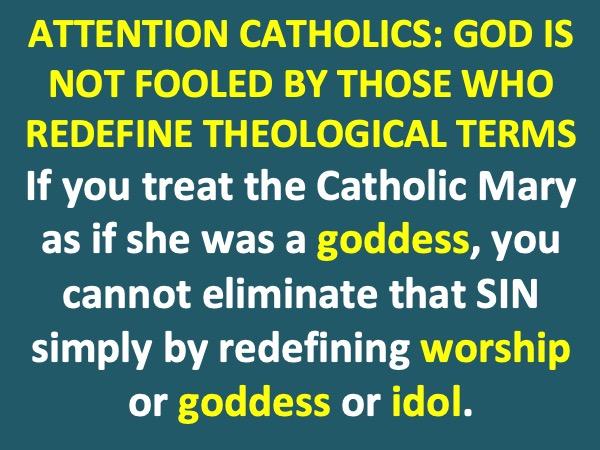
More weasel words: “Sacred Objects” & “Sacred Images”:
How do you redefine idols so that they are no longer viewed by your followers as idols? You call them “sacred objects” and “sacred images”. And that is precisely what the Catholic Church has done. And to add to their deception regarding idols, they point to sacred objects in the Old Testament to counter anyone who accuses them of idolatry. However, they neglect to understand that those sacred objects in the Old Testament, were “one of a kind” AND they were commanded by God. I am referring to the cherubim on the ark of the covenant (mentioned in Exodus 25:18) and the bronze serpent (mentioned in Numbers 21:8). There is not a single Catholic statue that meets either of those two criteria (one of a kind OR commanded by God). What we see in Catholicism regarding their use of statues is absolutely no different than what is practiced by the idol worshipers of Buddhism or Hinduism.
“Apostolic Tradition” – another example of weasel words:
The Catholic Church uses the term “apostolic tradition” to deceive people into thinking that any Catholic teachings not found in the Bible are still legitimate, because they are SUPPOSEDLY derived from “apostolic tradition”. Other similar terms include “sacred tradition”, “oral tradition” and “oral apostolic tradition”, which are simply terms used to hide the fact that a particular Catholic teaching is not found in the Bible, and is nothing more than an invention of the Catholic Church. Such “apostolic traditions” (meaning there is NO BIBLICAL EVIDENCE to support these Catholic teachings), include:
- the assumption of Mary
- the immaculate conception (Mary being conceived sinless)
- the canonicity of the Apocrypha
Additional information about problems with Rome’s “oral tradition” dogma can be found at: What Are Some Arguments against Apostolic Tradition?.
“Re-Present” – yet another example of weasel words:
Another case of weasel words in the Catholic Church is regarding their “sacrifice of the mass”. The weasel word they use is “re-present”. They invented this word so they can tell their gullible followers that they are doing something (that they made up) called “re-presenting” the sacrifice of Christ at Calvary. That is how they effectively deny the truth — that Jesus was speaking figuratively about bread being His body, in John chapter 6, verse 63 when He stated: “It is the spirit that quickeneth; the flesh profiteth nothing: the words that I speak unto you, they are spirit, and they are life.”.
The phrase “We cooperate with God’s grace”:
First I wish to note that in Catholicism, the word “grace” is often given an unbiblical meaning… Rather than giving the word grace the biblical meaning of “unmerited favor”, the Catholic Church teaches that “grace” is some kind of enabling power from God that helps a person do the good things that God wants them to do. Having said that, the phrase “We cooperate with God’s grace” is a Catholic invention. A Christian does not “cooperate” with God’s unmerited favor (i.e. God’s grace). They simply RECEIVE IT. And THEN out of a gratefulness to God for granting them salvation, they live a life of thankful service to God, as empowered by the Holy Spirit dwelling in them and working through them. Since they are not indwelt with the Holy Spirit, Catholics don’t even realize they are committing many sins against God, all the while they think they are cooperating with “God’s grace”. Those sins include:
1. They WORSHIP Mary and think they are being wonderful servants of God by venerating “the mother of God”. Yet they are committing the SIN of idolatry.
2. They kneel down before GRAVEN IMAGES, and think they are being wonderful servants of God by honoring their “saints” with these idols they call “sacred objects”. Yet they are committing the SIN of idolatry.
3. They elevate their pope to god-like status and call him their “Holy Father”, thinking they are being wonderful servants of God, and yet they are committing the SIN of blasphemy.
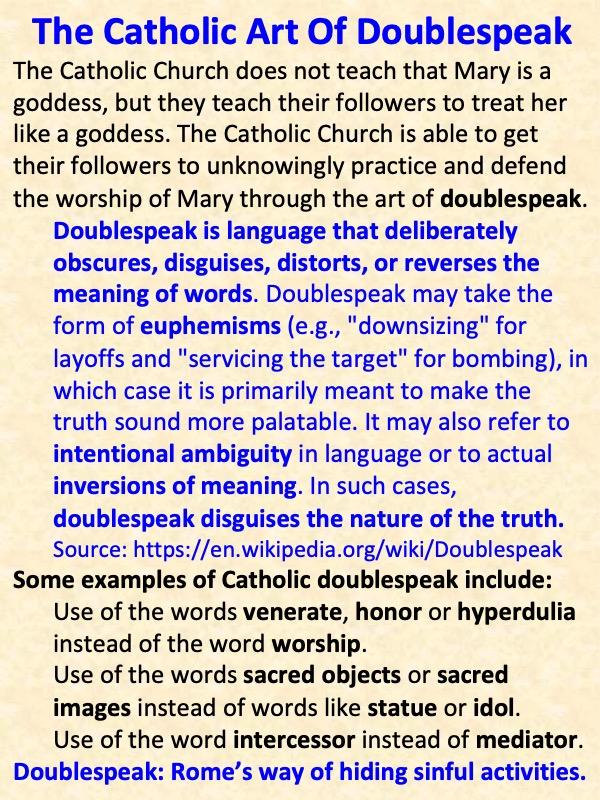
Summary:
You can fool some people but you can never fool God. God knows when you are sinning, even if you attempt to redefine words and relabel your sinful activities. Catholics condemn others who redefine abortion as “a woman’s right to choose”, yet Catholics and their Church have redefined many sins themselves, including the sin of idolatry. And being ignorant of the sins you commit does not remove one’s guilt either. It is far better to obey God, rather than sinful men (Acts 5:29). — RM Kane
“But in vain they do worship me, teaching for doctrines the commandments of men.” – Matthew 15:9
SEE ALSO:
How The Catholic Church Deceives Their Members
Additional information about various Catholic words for “worship” (at a Catholic website):




















Leave a Reply
You must be logged in to post a comment.